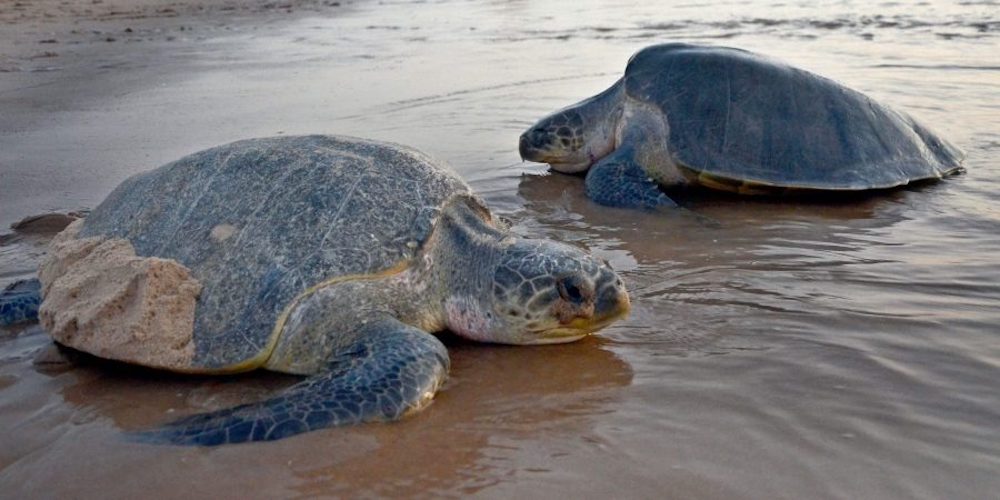India’s Efforts at Protecting the Endangered Species of Wild Fauna and Flora draw International Applause

India’s proposal for transferring Leith’s Softshell Turtle (Nilssonia leithi) from Appendix II to Appendix I of the Convention on International Trade in Endangered Species of wild fauna and flora (CITES) has been adopted by the Conference of Parties (CoP) to CITES in its 19th Meeting at Panama.
The meeting, which began on 14th November at Panama City, concluded on 25th November.
The Indian proposal was introduced by Shri Chandra Prakash Goyal, Director General of Forests & Special Secretary, MoEFCC on 23rd November 2022 when the Committee I of CoP took up the proposal for consideration.
Leith’s Softshell Turtle is a large freshwater soft-shelled turtle which is endemic to peninsular India and it inhabits rivers and reservoirs. The species have been subject to intensive exploitation over the past 30 years. They have been poached and illegally consumed within India. They have also been illegally traded abroad for meat and calipee.
The population of this turtle species is estimated to have declined by 90% over the past 30 years. So much so that the species are now difficult to find. No wonder why they are classified as ‘Critically Endangered’ by the International Union for Conservation of Nature (IUCN).
The species are listed on Schedule IV of the Wild Life (Protection) Act, 1972, which gives them protection from hunting as well as trade. However, poaching and illegal trade of protected turtle species are a major challenge in India with seizures of thousands of specimens reported every year.
Species level identification of seized specimens is also a challenge. Tortoises and freshwater turtles are targeted for the international pet, meat and calipee trade, as well as for illegal domestic consumption in some areas.
The CITES Appendix I listing of this Turtle species would ensure that legal international trade in the species does not take place for commercial purposes. It would also ensure that international trade in captive-bred specimens only takes place from registered facilities and further that higher and more proportionate penalties are provided for illegal trade of the species.
The listing of the Leith’s soft-shell turtle, thereby, strengthens its CITES protection status so as to ensure better survival of the species.
It may be noted that India’s similar efforts to protect other CITES at the CoP were very well appreciated. India’s proposal for inclusion of Jeypore Hill Gecko (Cyrtodactylus jeyporensis) in Appendix II and the transfer of Red-Crowned Roofed Turtle (Batagur kachuga) from Appendix II to Appendix I of CITES have also been adopted by the CoP in this meeting.
India’s proposal for induction of fresh water turtle Batagur kachuga also earned wide support.
Incidentally, India is implementing a programme called “Operation Turtshield” to curb wildlife crime.
Overall, CITES lauded and recorded the works done by India in the area of conservation of tortoises and freshwater turtles and efforts made in combating wildlife crime and illegal trade of turtles in the country. The resolution documents submitted by the CITES Secretariat on tortoises and freshwater turtles specifically mentioned the commendable result achieved by India in operations such as those initiated by the Wildlife Crime Control Bureau namely Operation Turtshield, which resulted in nabbing many criminals involved in poaching and illegal trade of freshwater turtles and substantial seizures made by the agencies in different part of the country.
At CITES CoP 19, India reiterated its commitment regarding conserving tortoises and freshwater turtles in the country. India also highlighted that many of the species of turtles and freshwater tortoises which are recognized as critically endangered, endangered, vulnerable or near threatened are already included in Wildlife Protection Act 1972 and given high degree of protection.
India pressed upon that listing of many such species in CITES Appendix II will further enhance the protection of the species from getting indiscriminately and illegally traded worldwide.
It is to be noted that at CoP of CITES, also known as the World Wildlife Conference, all 184 Parties to CITES have the right to attend, to put forward proposals for the Conference to consider, and to vote on all decisions.
CITES is an international agreement to which States and regional economic integration organizations adhere voluntarily. Although CITES is legally binding on the Parties – in other words they have to implement the Convention – it does not take the place of national laws. Rather it provides a framework to be respected by each Party, which has to adopt its own domestic legislation to ensure that CITES is implemented at the national level.



